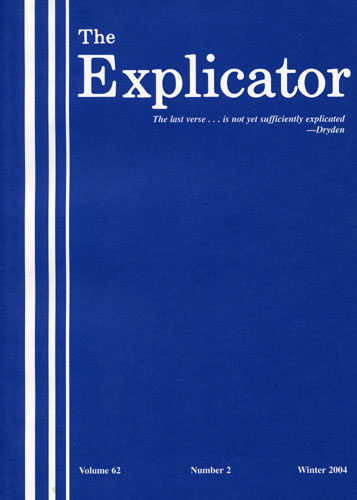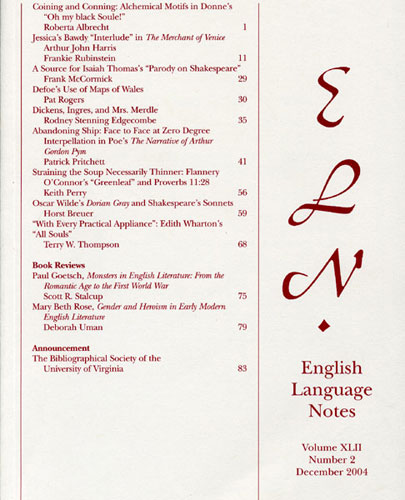



Dr. Arthur J Harris and Frankie Rubinstein challenge the use of
Alexander Pope's word 'merit', used by most modern editors of
Shakespeare's Merchant of Venice,
in III, v. Instead, they argue that editors should recognize the strong
element of bawdy in the scene, from beginning to end, and this
encourages them to opt for Shakespeare's original 'mean', as found in
all three early editions. They also point out that in the Middle
English Dictionary, the first definition of 'mean' is 'sexual
intercourse,' which reinforces their belief in the need to return to
Shakespeare's own 'mean'. Dr. Harris and Ms. Rubinstein trace the
evolution of the use of 'mean' to merit' and encourage editors to
recognize Shakespeare's full intentions that the short but amusing
scene
rises in a cresendo of bawdy and thus the scene would more likely not
be cut by most modern directors from their productions in the theatre.
Instead, audiences would enjoy a light, amusing diversion before the
long and challenging trial scene, in which Portia brutally triumphs
over Shylock, the beaten outsider in Venician life. It is also a scene
in which Jessica, Shylock's daughter, increasingly plays center stage.
What follows is an abstract of their published research in The Explicator and Notes and Queries, respectively.
Evolution and Dr. Harris' Abstract:
Sometime before 2001, I sent an essay I had been working on for many
years, in one form or another, on Shakespeare's Merchant of Venice,
III, v, to Frankie Rubinstein, whose home is Bryn Mawr, and who has
written much on Shakespeare's bawdy puns, including a Dictionary of
Bawdy Puns in Shakespeare. I needed it tested and she not only agreed
to test it but to add some crucial elements to it; and, indeed, she
wisely suggested we separate it into two shorter essays for clarity's
sake, the first focusing of the term 'mean', the second on the larger
aspects of the scene's significance within the work itself.
Jessica is speaking:
"And if on earth he do not mean it, then
In reason he should never come to Heaven.
III.v.65-66
It is a line recorded variously in all three early editions (First Quarto, Second Q., and First Folio) of the play, but it remained 'mean' in Shakespeare's time. Alexander Pope, however, exactly 100 years after Shakespeare's First Folio was printed, in The Age of Enlightment, missing Shakespeare's intention to include an element of bawdy in the scene, tossed out, in his edition, the 'mean' and changed it to 'merit', apparently assuming that the scene should be read on one level only: that is, if Bassiano did not live a good (merit) life here on earth, he would never get to heaven). Pope, like many after him, apparently read Shakespeare on one level. Editions of the nineteenth century, for the most part, had honored Shakespeare's 'mean', including Henry Howard Furness, editor of the Variorum edition.
For many years it bothered me that most modern editions, ignoring nineteenth century good sense, have returned to Pope's 'merit', including the Oxford and the Cambridge editions. M. M. Mahood of the Cambridge edition, for example, says, "'mean' makes no sense." I was determined to change that, since to me the entire scene is bawdy, from beginning to its final line, also spoken by the bride Jessica to her new husband, Lorenzo, "Well, I'll set you forth." This is the only time, to my knowledge, that Shakespeare uses the phrase "set forth" with a "you" breaking in between. But more than one modern scholar has noted the use of "set forth" as bawdy, and in fact, even "Well," has come to the attention, not only of Ms. Rubinstein in a lengthy list of support, but also of the highly respected newer critic, Gordon Williams, in his Glossary (1997), whom Stanley Wells (Looking for Sex, 2004) sees as "sane, scholarly but frank." Here, then, surely "Well," must be seen on two levels: first as an interjection used to introduce a remark, that is, Jassica's reference to leading her husband in to dinner, and, second, it must be seen in its bawdy context as part of her wordplay ("set you forth") in the scene as a whole.
The scene is prepared for in advance by the final lines of the preceding scene between Portia and Nerissa. Nerissa asks, "Why, shall we turn to men?" And Portia answers, "Fie, what a question's that,/ If thou wert near a lewd interpreter!", the two women thus preparing the audience for the light and bawdy scene that follows. Scene III,v, then begins with Lancelot's suggestion that Jessica is illegitimate, moves through more bawdy with the arrival of Lorenzo, and the men's jokes about "cover the table, serve in the meat, and we will come in to dinner,"(all words italicized, at least, are recognized by certain scholars as sometimes bawdy and food is often associated with sex) to a crescendo in Jessica's response to Lorenzo's question: "How dost thou like the Lord Bassanio's wife?" meaning of course Portia. Jessica replies:
Past all expressing. It is very meet
The Lord Bassanio live an upright life,
For having such a blessing in his lady
He finds the joys of heaven here on earth,
And if on earth he do not mean it,
In reason he should never come to heaven.
Why, if two gods should play some heavenly match,
And on the wager lay two earthly women,
And Portia one, there must be something else
Pawned with the other, for the poor rude world
Hath not her fellow.(all italics ours)
It all began for me in 1955 when my Professor, John Russell Brown, published his text of the New Arden edition of The Merchant and still kept Pope's "merit." No one, however, at that time questioned Professor Brown's retaining of Pope's 'merit' except me, a lowly graduate student. This was at the Shakespeare Institute, at Mason Croft, a medieval building at Stratford-on-Avon. When I heard his clump, clump, clumping coming down the three flights of ancient stairs, I waited at the foot, in the front hall, and stopped him. I asked him why he hadn't returned 'mean' to Shakespeare's text and that the scene was essentially bawdy. He took the text from my hand, glanced at it, and handed it back, with something like "No, no, no, that's impossible." Thus began my determination to have readers recognize the bawdy element to the scene, with that particular speech, a triumph of double entendre, as my principal focus, with Jessica at her most witty. All we need to be, as Portia hints to us at the end of the preceding scene (III.v.80), are Jessica's "lewd interpreter(s)."
Several years later, in the early sixties, as a member of the English Department of the University of Michigan, where the new Middle English Dictionary was being edited, I had the privilege of seeing the "M" section in its still manuscript form. Looking through the manuscript, I discovered that the first definition of 'mean' in Middle English is "sexual intercourse." I felt vindicated in my belief that the scene is delightfully bawdy. 'Mean' may have been an old word, little used as such in Shakespeare's time, but he, growing up in the earthy heart of the English countryside, would have known it and used it in an otherwise pretty evidently bawdy passage.
Finally, in recent years, the two manuscripts (developed out of one)
went back and forth between Ms. Rubinstein at Bryn Mawr and myself at
Ypsilanti, Michigan, and we were almost ready to submit them for
publication, when, on my birthday, 6 March 2001, I had a stroke in
Arizona. Ms. Rubinstein generously continued to concentrate on the
final touches,
with extended notes, to ready the papers and send them forth.
One has already been published in The Explicator, 62:2 (Winter 04) out
of Washington, D.C., a well respected small journal. The other is
coming forth, we understand, in the long respected Notes and Queries in
late 2004 or early 2005. We both look forward to its publication
at last.